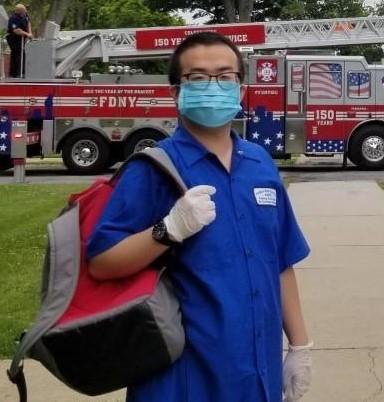Bin Feng and his wife were newlyweds when they moved to the United States from East China – he from Hangzhou and she from Shanghai – in 1992. The graduate students came on work visas looking to make a life in a new land. With limited knowledge of English, the Fengs, like many immigrants, struggled to make ends meet. Their challenges were compounded when they welcomed their son, Vincent, into their family. At the age of three, Vincent was formally diagnosed with autism. The Fengs found very little support in their community and realized they had to look outside to get the help they needed to raise their son.

Today, Vincent is a thriving 21-year-old who receives YAI services and is learning to build relationships and friendships. To be better equipped to help his son, Feng attended a virtual YAI sex education training workshop this past May. He credits it for giving him the necessary tools to discuss sexual health with his son. It’s a conversation he admits he struggles with because of his lack of knowledge and his cultural upbringing that often stigmatizes it.
The two-part workshop answered questions from parents about how to prepare children for puberty, how to support their children to have a healthy sexuality, and skills to help prevent abuse. The workshop was translated to Mandarin for the first time after seeing growing interest from Chinese parents. Feng said Asian families who struggle with the language and cultural barrier want to see more workshops like these because it reduces their frustrations and provides them with valuable information to support their children’s needs.
“Parents often are seen as barriers to social-sexual development for their children with intellectual and developmental disabilities (I/DD) and it’s fantastic there was such a huge turnout from a culture where it’s a taboo topic,” said Consuelo Senior, Assistant Director of YAI Knowledge, the agency’s stand-alone training department.
One in 88 Asian and Pacific Islander children are identified to be on the autism spectrum in the United States, according to a 2016 CDC report. This number is comparable to the prevalence rates among Black and Hispanic children, which is 1 in 76 and 1 in 99, respectively. Although families like Feng’s are trying to break through, there are still many Asian communities that have a hard time getting interpreters for the services they need and cannot understand complicated jargon that is required to navigate the healthcare system and other government assistance programs.
In a culture where sex is rarely discussed and conversations around children and adults with disabilities are usually discouraged, the people in the community who are seeking to change that said they hope a proactive approach to their children’s needs will help remove some of the stigma.
“In the Chinese community, I see the older generation of parents who say ‘why should we meet the sexual needs if the kid already has a disability and doesn’t have the ability?’ They feel their children will be victims if exposed to it and try to protect their child by denying them the needs,” Feng said.
“But parents like me, we know our child has rights, but my question is how do we talk to them in a way where the child and parent are both comfortable talking about it,” he added.
These sex-positive parents, although still a small percentage, want their children to have the full range of the human experience the best way they can.
“Because of the culture, even when the child gets the training, you hear that the families won’t allow them to have relationships so you will hear a lot of young adults who will say I can’t date until I am 30 or I can’t have sex at all until I get married,” said Senior. “That sense of autonomy is one of the challenges because as a parent of a child with a disability, you don’t want them to be hurt.”
To ease anxiety of the adult years and the changes that come with it, Senior stresses the need for pre-planning in order to avert a crisis. “Parents don’t realize their kids will have trauma in puberty,” said Senior. “Some parents don’t think their kids will go through puberty because they have a developmental disability, but biologically they are the same.”
“I encourage parents, especially those who come from a cultural background where information is scarce, to join groups and hear from each other,” Senior said. “If parents take away one thing from my workshops, I hope it’s the awareness that their child is a sexual being and that sexuality does not mean sex.”
Bin Feng hopes to use the resources he’s been able to access through YAI to help other Chinese immigrants, bridging the gap to crucial services and programs often lacking in their community.

